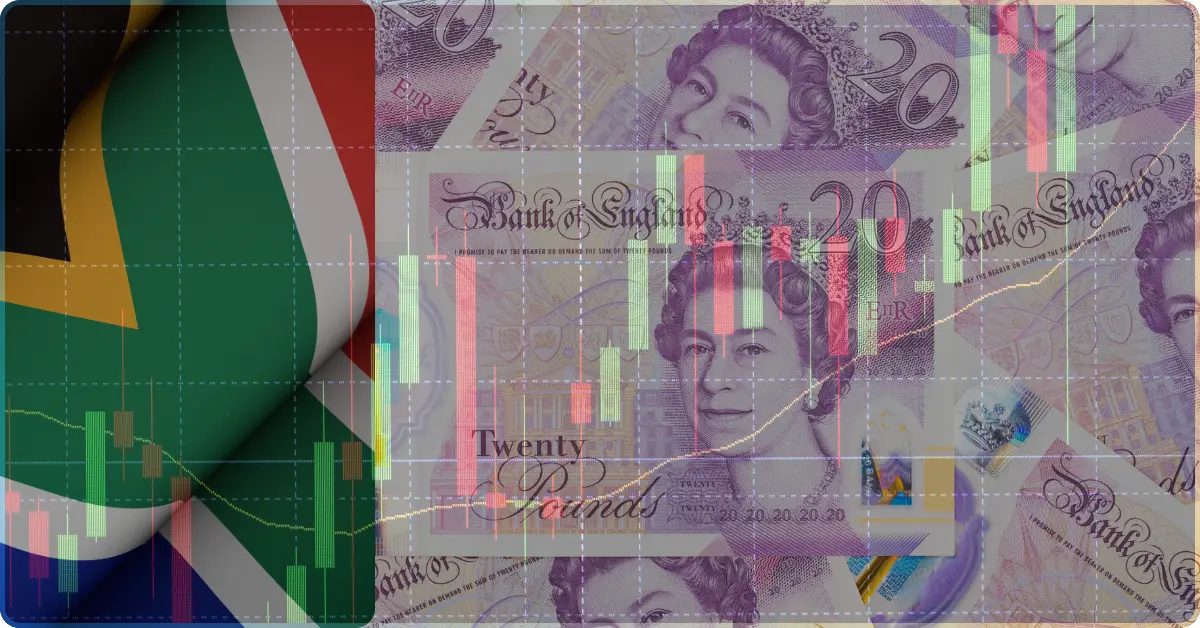The relationship between the British Pound (GBP) and the South African Rand (ZAR) is defined through their exchange rate (GBP/ZAR). The exchange rate has experienced a volatile market in the past five years, while the pound to rand forecast suggests that fluctuations will follow.
The exchange rate between GBP/ZAR has shifted through history, affected by various economic factors such as interest rates, inflation, and political relations between the UK and South Africa.
As of the latest, the exchange rate is 1 British Pound is approximately equal to 22.79 South African Rand.
In this article, we’ll discuss the pound to rand currency pair, its history, and forecast.
What is the GBP/ZAR Currency Pair?
The GBP/ZAR currency pair, or the currency pair between the British Pound and the South African Zar is considered an exotic currency pair because it is not as commonly traded as the major pairs like EUR/USD or GBP/USD.
The GBP/ZAR is known for its significant price swings, offering extreme volatility to traders. This volatility is often explained by the close economic relationships between the UK and South Africa.
Read more: 5 Best Cryptocurrency Exchanges in South Africa
The GBP/ZAR currency pair is traded 24 hours a day, five days a week. However its most active trading periods are during the overlap of the London and South African forex hours. Since South Africa is 2 hours ahead of London, the overlap occurs at 9:00 AM to 3:00 PM UTC.
How to read a GBP/ZAR Price Chart
The price chart for a currency pair represents the exchange rate of the two currencies, in this case, the GBP/ZAR.
The GBP represents the base currency (the first currency in the pair), which is the currency you are buying or selling. Meanwhile, ZAR is the quote currency (the second currency in the pair) which shows how much of the quote currency is needed to purchase one unite of the base currency.
So for example, if the exchange rate for GBP/ZAR is 22.91, this means that for every 22.91 rand, you can buy 1 pound.
Here are some of the most common exchanges between GBP/ZAR.
| 90 pounds to rands | R 2051.94 |
| 120 pounds to rands | R 2735.92 |
| 500 pounds to rands | R 11399.66 |
Pound to Rand Forecast
The forecast for the GBP/ZAR exchange rate suggests continued volatility. Over the next few weeks, the rate is projected to stay within a similar range.
A Short History of the British Pound
The British pound or the sterling (GBP) is the currency of the United Kingdom. It is also the world’s oldest currency that is still in use.
It is among the strongest and most traded currencies in the foreign exchange market, and is the fourth most-held reserve currency in global reserves. The pound is issued and distributed by the Britain’s central bank the Bank of England.
Historically, the pound was and is used by the colonies and territories of the British Empire, of which South Africa was one before winning independence. At present, some overseas British Overseas Territories have local currencies pegged to the sterling such as Saint Helena, South Georgia, and Gibraltar.
The face of the reigning monarch is always featured on British coins, and the design and make is updated for each new monarch.
A Brief History of the South African Rand
The rand has a rich history that accompanies South Africa’s development as an independent country and post-apertheid.
The South African Rand (abbreviated ZAR or R) is the national currency of South Africa. It is produced in coins and banknotes and is issued by the South African Reserve Bank (SARB) in Pretoria.
Before the rand, South Africa’s currency was controlled and imposed by their colonizers.
The first currency in SA was actually Dutch. In the 1600s, Dutch traders brought the Dutch guilder currency to SA. And then, in 1782, they brought the first paper money into Cape Town.
Dutch money was soon replaced when British colonizers had invaded and took control of the region. During that time, South African currency became the pound and the shilling.
It was only in February 14 1961 that the round replaced the pound, right before South Africa became a republic. The South African rand replaced the pound at a rate of 2 rand to 1 pound.
Its name come from the Witwatersrand, the ridge where Johannesburg was built and where most of South Africa’s gold deposits are found.
Historical Ties Between the Pound and Rand
When South Africa, particularly Cape Town, became a colony of Britain in 1825, the South African pound was used as currency in the country.
The South African pound remained equal in value with the British Pound until 1931. If one could imagine, if you were a forex trader in Cape Town, you would not be able to exchange your local currency to the GBP, because your money’s value would already be GBP!
However, the South African pound was different in make, for instance, the currency issued in the Boer state as inscribed in Afrikaans, instead of English.
Throughout the colonial period, Britain occupied, mined, and extracted precious minerals in South Africa, including gold, diamonds, copper, iron, and exported it back to Britain.
Britain’s control over South Africa ended when the Union of South Africa was established in 1910. This union united the previously separated British colonies in South Africa.
However, the union would also cause severe racial segregation that later evolved to apartheid.
During apartheid, the UK had complex relations with South Africa that was marked by economic ties and political tensions.
Economically, Britain helped South Africa to sustain their economy during apartheid. The UK was SA’s largest trading partner, which allowed South Africa to access capital and international markets. British banks were also heavily involved in providing loans to South Africa, making up for nearly 50% of SA’s total borrowing.
However, the political relationship between Britain and South Africa was filled with tension. During the early years of apartheid, Britain maintained relations with the white minority government and reinforced the apartheid system. Additionally, Britain resisted the international call to sanction South Africa, largely because of a vested economic interest in the country.
Take your trading knowledge to the next step
Keep pace with trading news, industry insights, and market analysis on CommuniTrade. Pose questions, validate information, and join conversations that matter.
Get started here.

















